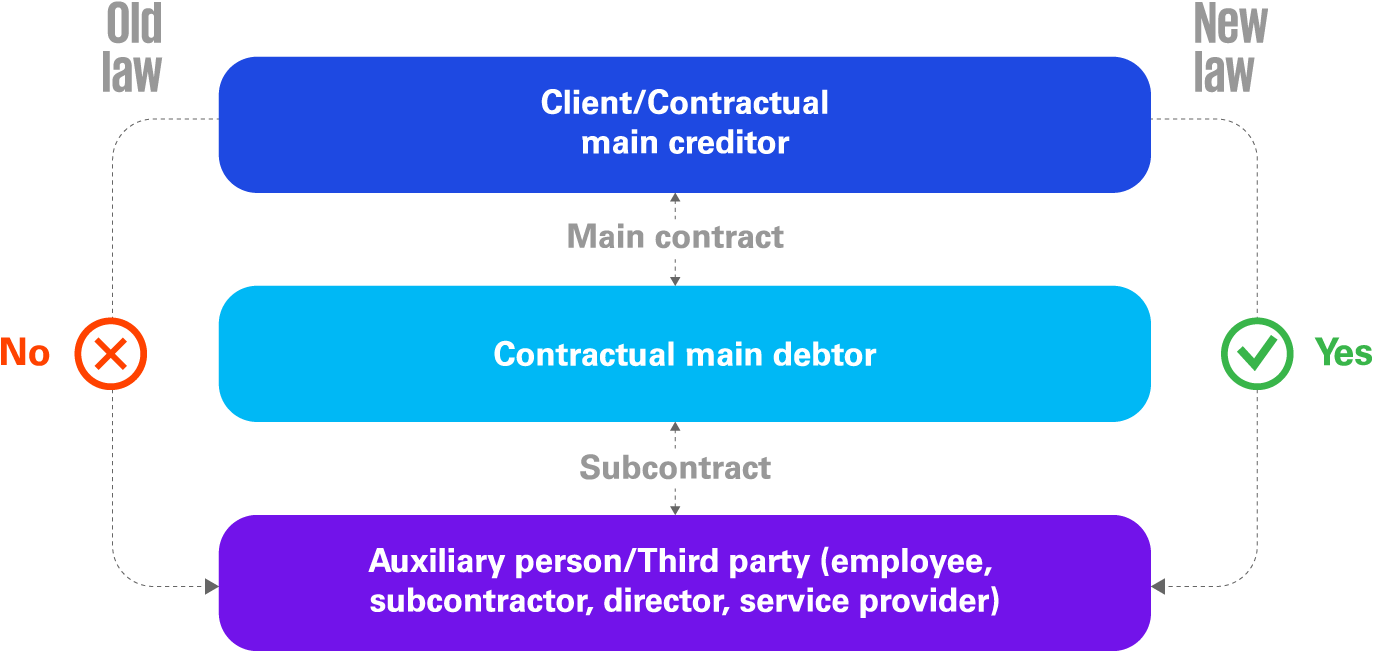

The quasi-immunity of the auxiliary person is no more

The proposed law introducing the new Book 6 of the Civil Code regarding extracontractual liability abolishes the quasi-immunity of the auxiliary person.
We hereby outline the main consequences of this legislative change for you.
1. The auxiliary person and their quasi-immunity (a refresher)
The term "auxiliary person" refers to natural or legal persons entrusted by the debtor of a contractual obligation with the full or partial performance of this obligation, regardless of whether they perform this obligation on their own behalf and in their own name or on behalf and in the name of the debtor[1].
This includes: employees, subcontractors, service providers, directors, representatives, freelancers, and more.
Until now, the auxiliary person has enjoyed strong protection ("so-called quasi-immunity") against contractual claims from the client in case of a contractual breach or error. Indeed, today the auxiliary person cannot be held accountable based on the main contract between the client and the main debtor, as they are not a party to it.
The client also typically comes up short in the realm of extracontractual matters, as the Belgian Court of Cassation holds that the auxiliary person cannot be considered a "true" third party to the execution of the contract[2], but rather a so-called "involved" third party.
In summary: currently, the auxiliary person is quasi-entirely immune against a claim from the client when they commit a breach or error. Under current law, liability for contractual damages must (in principle) always be settled from link to link, so that the auxiliary person can only be held accountable by their direct client.
As a result, employees, directors, service providers, suppliers, etc., are typically not directly liable to the clients of their respective employers, companies, and end-clients.

2. Abolition of quasi-immunity (the new basic rule)
As of the entry into force of Book 6, the aforementioned (historical) quasi-immunity will be abolished.
The legislator deems it unreasonable that a client who has been harmed cannot seek redress from the auxiliary person in any way, regardless of the errors they commit.[3] The legislator refers, among other things, to the situation where the main debtor has since gone bankrupt, leaving the client empty-handed.
Under the new law, the client will now be able to directly hold every auxiliary person liable as a "true" third party on an extracontractual basis for breaches of the general duty of care (art. 6.3, §2 Proposal Book 6 CC).
3. Concrete consequences of the new regulation
Let's consider an example in the construction sector.
Imagine: the property owner commissions a contractor for a large-scale renovation project, who undertakes the entire renovation work. The contractor subcontracts the roofing work to a subcontractor. The roofing company, in turn, sends its employees (or independent subcontractors) to the site. Afterwards, it turns out that the work was not performed according to the standards. Previously, the property owner could only address the main contractor for this defective execution.
From the entry into force of the new law, the property owner will be able to directly take action against the subcontractor and even against the employees (or independent subcontractors) of the subcontractor in question, if they have committed an extracontractual error.
This significantly improves the position of the injured party, and the auxiliary person will now be exposed to the legal arrows of multiple parties.
4. Nuance (legal exceptions)
The new regulation does not undermine the so-called special legal exceptions.
For example, the immunity of the employee for a single minor fault, as included in Article 18 WAO, remains intact. However, the employee can be directly addressed for intentional fault, serious fault, and repeated minor faults ...
It should also be noted that the so-called higher legal norm (e.g., international/European law) and the so-called "lex specialis" take precedence over Book 6 in case of contradiction.
5. Other corrections in favor of the auxiliary person
To balance the interests of the parties, the legislator has provided two additional corrections to protect the auxiliary person:
- The auxiliary person can invoke against the injured party the same defenses that the main debtor can invoke based on the main contract. The legislator considers it fair that the injured party does not have more rights against the auxiliary person than against its direct contracting party.
Examples of defenses include: clauses limiting liability towards the client, penalty clauses, payment deferments, prescription exceptions, etc.
Note: the relevant clauses must obviously not contradict Book 5 (Law of Obligations) or the Economic Law Code or other mandatory rules.
- The auxiliary person can also rely on the defenses from its so-called "subcontract", namely: the agreement that the auxiliary person itself has entered into with the main debtor.
For example: if the auxiliary person has included a valid exemption clause in its subcontract, some authors already assume that it can also invoke this clause as a defense against the so-called main contractor.
However, there is a debate as to whether the new law allows it to be agreed in the subcontract that the auxiliary person is never liable extracontractually.
The aforementioned corrections do not apply, however, if the injured party suffers physical or psychological damage and cannot be invoked as an exception for intentional faults.
6. Contractual elimination
Book 6 will primarily be of supplementary law, so that the parties to the contract can deviate from it contractually.
A good drafting of the contract between the client and the main debtor on the one hand, and that between the main debtor and the auxiliary person on the other hand, can therefore provide additional relief.
For example, it is possible to explicitly and unambiguously include a "conventional non-cumulation clause" in the main contract between the client and the main debtor. Such a non-cumulation clause means that compensation for damage resulting from a contractual breach is excluded from the scope of extracontractual liability. Contractual damage cannot then be the basis for an extracontractual claim.
The auxiliary person can also protect itself by providing sufficient liability limitations in the subcontract concluded with its contracting party (the main debtor). The auxiliary person can indeed invoke these defenses against the injured party (/client) as well.
It is of course possible to agree in the subcontract on warranty schemes.
7. Entry into force?
The new regulation enters into force on the first day of the sixth month following the month in which the law is published in the Belgian Official Journal (probably June or July 2024).
There is still no clarification on the temporal application of the new law. The question of whether the new provisions will apply to the consequences of 'old' contracts remains unanswered for the time being.
This is another reason why it is advisable to review your existing contracts today and bring certainty for yourself and your contracting parties.
[1] Cass. 24 maart 2016, C. 14.0329.N; Cass. 12 maart 2020, C.19.0408.N.
[2] Cass. 7 december 1973, Arr.Cass. 1974, 395; Cass. 8 april 1983, RW 1983-84, 16
[3] Wetsvoorstel houdende boek 6 “Buitencontractuele aansprakelijkheid” van het Burgerlijk Wetboek, Parl.St. 2022-23, nr. 3213/001, 34.




